2010俄语四级听力真题与答案
- 格式:doc
- 大小:38.50 KB
- 文档页数:2

俄语专业四级-13(总分:200.00,做题时间:90分钟)一、ДИКТАНТ(总题数:1,分数:10.00)1.__________________________________________________________________________________________ [听力原文]二、АУДИРОВАНИЕ (总题数:0,分数:0.00)三、Диалог (总题数:1,分数:6.00)(分数:6.00)(1).A.B.C.D.A.B.C. √D.[听力原文](2).A.B.C.D.A.B. √C.D.[听力原文](3).A.B.C.D.A. √B.C.D.[听力原文]四、Текст 1 (总题数:1,分数:8.00) (分数:8.00)(1).A.B.C.D.A.B.C. √D.[听力原文](2).A.B.C.D.A.B.C.D. √[听力原文](3).A.B.C.D.A.B. √C.D.[听力原文](4).A.B.C.D.A. √B.C.D.[听力原文]五、Текст 2 (总题数:1,分数:6.00) (分数:6.00)(1).A.B.C.D.A.B. √C.D.[听力原文](2).A.B.C.D.A. √B.C.D.[听力原文](3).A.B.C.D.A.B.C. √D.[听力原文]六、ЗНАНИЯПОРУССКОМУЯЗЫКУ (总题数:0,分数:0.00)七、ГРАММАТИКА(总题数:70,分数:35.00)A.B.C.D.(分数:0.50)A.B. √C.D.A.B.C.D.(分数:0.50)A.B.C.D. √A.B.C.D.(分数:0.50)A. √B.C.D.A.B.C.D.(分数:0.50)A.B.C.D. √A.B.C.D.(分数:0.50)A.B.C. √D.A.B.C.D.(分数:0.50)A.B.C. √D.A.B.C.D.(分数:0.50)A.B. √C.D.A.B.C.D.(分数:0.50)A.B. √C.D.A.B.C.D.(分数:0.50)A.B.C. √D.A.B.C.D.(分数:0.50)A.B.C.D. √A.B.C.D.(分数:0.50)A.B. √C.D.A.B.C.D.(分数:0.50)A.B. √C.D.A.B.C.D.(分数:0.50)A. √B.C.D.A.B.C.D.(分数:0.50)A.B. √C.D.A.B.C.D.(分数:0.50)A. √B.C.D.A.B.C.D.(分数:0.50)A. √B.C.D.A.B.C.D.(分数:0.50)A. √B.C.D.A.B.C.D.(分数:0.50)A. √B.C.D.A.B.C.D.(分数:0.50)A. √B.C.D.A.B.C.D.(分数:0.50)A. √B.C.D.A.B.C.D.(分数:0.50)A.B. √C.D.A.B.C.D.(分数:0.50)A. √B.C.D.A.B.C.D.(分数:0.50)A.B.C. √D.A.B.C.D.(分数:0.50)A. √B.C.D.A.B.C.D.(分数:0.50)A. √B.C.D.A.B.C.D.(分数:0.50)A.B. √C.D.A.B.C.D.(分数:0.50)A. √B.C.D.A.B.C.D.(分数:0.50)A.B.C.D. √A.B.C.D.(分数:0.50)A. √B.C.D.A.B.C.D.(分数:0.50)A.B.C. √D.A.B.C.D.(分数:0.50)A.B.C. √D.A.B.C.D.(分数:0.50)A.B.C. √D.A.B.C.D.(分数:0.50)A.B.C. √D.A.B.C.D.(分数:0.50)A. √B.C.D.A.B.C.D.(分数:0.50)A. √B.C.D.A.B.C.D.(分数:0.50)A.B. √C.D.A.B.C.D.(分数:0.50)A.B. √C.D.A.B.C.D.(分数:0.50)A.B. √C.D.A.B.C.D.(分数:0.50)A.B. √C.D.A.B.C.D.(分数:0.50)A.B.C.D. √A.B.C.D.(分数:0.50)A.B.C.D. √A.B.C.D.(分数:0.50)A. √B.C.D.A.B.C.D.(分数:0.50)A. √B.C.D.A.B.C.D.(分数:0.50)A.B. √C.D.A.B.C.D.(分数:0.50)A.B.C.D. √A.B.C.D.(分数:0.50)A.B.C. √D.A.B.C.D.(分数:0.50)A.B.C. √D.A.B.C.D.(分数:0.50)A.B.C. √D.A.B.C.D.(分数:0.50)A.B.C.D. √A.B.C.D.(分数:0.50)A.B.C. √D.A.B.C.D.(分数:0.50)A.B. √C.D.A.B.C.D.(分数:0.50)A. √B.C.D.A.B.C.D.(分数:0.50)A.B. √C.D.A.B.C.D.(分数:0.50)A.B. √C.D.A.B.C.D.(分数:0.50)A. √B.C.D.A.B.C.D.(分数:0.50)A.B. √C.D.A.B.C.D.(分数:0.50)A.B.C. √D.A.B.C.D.(分数:0.50)A.B.C. √D.A.B.C.D.(分数:0.50)A.B.C. √D.A.B.C.D.(分数:0.50)A.B.C.D. √A.B.C.D.(分数:0.50)A.B. √C.D.A.B.C.D.(分数:0.50)A. √B.C.D.A.B.C.D.(分数:0.50)A.B.C. √D.A.B.C.D.(分数:0.50)A.B. √C.D.A.B.C.D.(分数:0.50)A.B. √C.D.A.B.C.D.(分数:0.50)A.B.C.D. √A.B.C.D.(分数:0.50)A. √B.C.D.A.B.C.D.(分数:0.50)A.B.C.D. √A.B.C.D.(分数:0.50)A. √B.C.D.A.B.C.D.(分数:0.50)A.B.C.D. √八、ЛЕКСИКА(总题数:20,分数:20.00)A.B.C.D.A.B. √C.D.A.B.C.D.A.B.C.D. √A.B.C.D.A. √B.C.D.A.B.C.D.A.B.C.D. √A.B.C.D.A.B.C.D. √A.B.C.D.A.B.C. √D.A.B.C.D.A.B.C.D. √A.B.C.D.A.B. √C.D.A.B.C.D.A.B.C. √D.A.B.C.D.A.B.C. √D.A.B.C.D.A.B.C. √D.A.B.C.D.A.B. √C.D.A.B.C.D.A. √B.C.D.A.B.C.D.A.B. √C.D.A.B.C.D.A.B. √C.D.A.B.C.D.A.B.C. √D.A.B.C.D.A.B.C. √D.A.B.C.D.A. √B.C.D.A.B.C.D.A.B.C. √D.A.B.C.D.A.B.C. √D.九、СТРАНОВЕДЕНИЕ(总题数:5,分数:5.00)A.B.C.D.A. √B.C.D.A.1812B.1825 √C.1905D.1917A.B.C.D.A.B.C.D. √A.B.C.D.A.B.C. √D.A.B.C.D.A.B. √C.D.十、РЕЧЕВОЙЭТИКЕТ(总题数:5,分数:10.00)A.B.C.D.A.B. √C.D.A.B.C.D.A.B.C. √D.A.B.C.D.A.B.C. √D.A.B.C.D.A.B.C. √D.A.B.C.D.A.B.C. √D.十一、ЧТЕНИЕ (总题数:0,分数:0.00) 十二、Текст 1 (总题数:1,分数:4.00)4.00)A.B.C.D.A.B.C.D. √A.B.C.D.A.B. √C.D.十三、Текст 2 (总题数:1,分数:6.00)6.00)A.B.C.D.A.B.C.D. √A.B.C.D.A.B.C.D. √A.B.C.D.A.B. √C.D.十四、Текст 3 (总题数:1,分数:4.00)4.00)A.B.C.D.A.B. √C.D.A.B.C.D.A.B.C. √D.十五、Текст 4 (总题数:1,分数:6.00)6.00)A.B.C.D.A.B. √C.D.A.B.C.D.A.B.C. √D.A.B.C.D.A.B.C. √D.十六、ВСТАВКА (总题数:1,分数:10.00)(1).A.B.C.D.A.B.C. √(2).A.B.C.D.A.B. √C.D.(3).A.B.C.D.A. √B.C.D.(4).A.B.C.D.A.B.C. √D.(5).A.B.C.D.A.B.C. √(6).A.B.C.D.A. √B.C.D.(7).A.B.C.D.A.B.C. √D.(8).A.B.C.D.A. √B.C.D.(9).A.B.C.D.A. √B.C.D.(10).A.B.C.D.A. √B.C.D.十七、ГОВОРЕНИЕ (总题数:1,分数:40.00)(分数:40.00)____________________________________________________________________________________________________________________________________________________________________________________十八、СОЧИНЕНИЕ(总题数:1,分数:30.00)(分数:30.00)__________________________________________________________________________________________ 略。
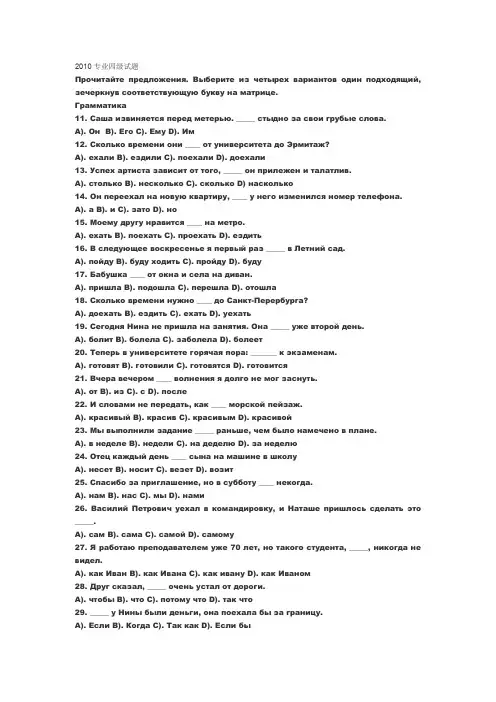
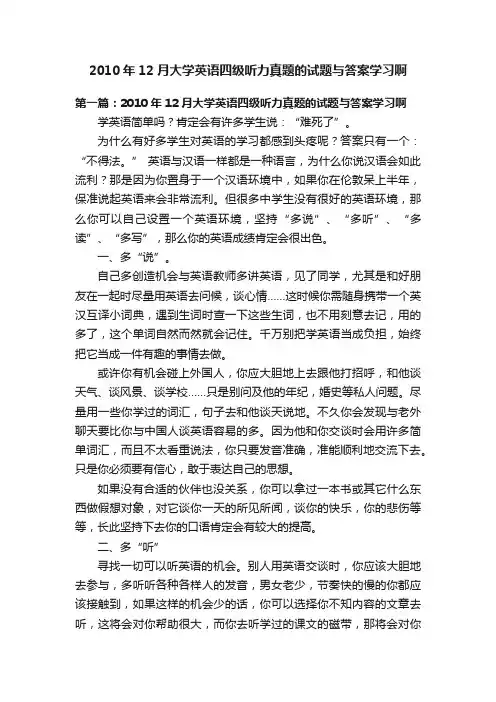
2010年12月大学英语四级听力真题的试题与答案学习啊第一篇:2010年12月大学英语四级听力真题的试题与答案学习啊学英语简单吗?肯定会有许多学生说:“难死了”。
为什么有好多学生对英语的学习都感到头疼呢?答案只有一个:“不得法。
” 英语与汉语一样都是一种语言,为什么你说汉语会如此流利?那是因为你置身于一个汉语环境中,如果你在伦敦呆上半年,保准说起英语来会非常流利。
但很多中学生没有很好的英语环境,那么你可以自己设置一个英语环境,坚持“多说”、“多听”、“多读”、“多写”,那么你的英语成绩肯定会很出色。
一、多“说”。
自己多创造机会与英语教师多讲英语,见了同学,尤其是和好朋友在一起时尽量用英语去问候,谈心情……这时候你需随身携带一个英汉互译小词典,遇到生词时查一下这些生词,也不用刻意去记,用的多了,这个单词自然而然就会记住。
千万别把学英语当成负担,始终把它当成一件有趣的事情去做。
或许你有机会碰上外国人,你应大胆地上去跟他打招呼,和他谈天气、谈风景、谈学校……只是别问及他的年纪,婚史等私人问题。
尽量用一些你学过的词汇,句子去和他谈天说地。
不久你会发现与老外聊天要比你与中国人谈英语容易的多。
因为他和你交谈时会用许多简单词汇,而且不太看重说法,你只要发音准确,准能顺利地交流下去。
只是你必须要有信心,敢于表达自己的思想。
如果没有合适的伙伴也没关系,你可以拿过一本书或其它什么东西做假想对象,对它谈你一天的所见所闻,谈你的快乐,你的悲伤等等,长此坚持下去你的口语肯定会有较大的提高。
二、多“听”寻找一切可以听英语的机会。
别人用英语交谈时,你应该大胆地去参与,多听听各种各样人的发音,男女老少,节奏快的慢的你都应该接触到,如果这样的机会少的话,你可以选择你不知内容的文章去听,这将会对你帮助很大,而你去听学过的课文的磁带,那将会对你的语言语调的学习有很大的帮助。
三、多“读”。
“读”可以分为两种。
一种是“默读”。
每天给予一定时间的练习将会对你提高阅读速度有很大的好处,读的内容可以是你的课本,但最好是一些有趣的小读物,因为现在的英语高考越来越重视阅读量和阅读速度。

大学俄语四级答案解析(总18页)--本页仅作为文档封面,使用时请直接删除即可----内页可以根据需求调整合适字体及大小--00年大学俄语四级答案解析2006-3-31 16:42Часть 1 АУДИРОВАНИЕА.1.а2.а3.в4.а5.бБ.6.в7.б8.а9.а 10.в11.в 12.а 13.б 14.в 15.вЧАСТЬ 2 ЧТЕНИЕ16. В 17. В 18. Б 19. В 20. Б21. В 22. В 23. А 24. В 25. В26. В 27. А 28. Б 29. А 30. АЧАСТЬ 3 СЛОВАИГРАММАТИКА31. А 32. В 33. Б 34. А 35. В36. А 37. Б 38. Б 39. А 40. Б41. А 42. В 43. Б 44. А 45. А46. Б 47. В 48. А 49. В 50. Б51. Ему52. внимателен53. выраженная54. педагогическойработой55. работающий56. самому57. вхудожественнойработе58. себя59. вошедших60. надязыкомЧАСТЬ 4 ПЕРЕВОД61. 显然,一个人周围日常社会环境在其成人思维的形成中起着很大作用。
62.甚至当代大多数家长和老师都想让自己孩子们的幸福和周围人们的幸福相联系。
63.如果父亲自己躺在沙发上,而妻子在洗餐具时,他不能强迫儿子去帮助母亲。
64. 所有的好处,给自己的话,如果你不是最后一个,那么剩余的人会依次得到这些好处。
65. 应当经常遵循这样一个规则:你可以做什么,那么其他人也可以做,而其他人不能做什么,那你也不能去做。
2000年大学俄语四级考试答案及详解一、听力理解 (听力材料在最后)1. 根据НуМаша, ничегонетлучшевмолодости, утебявсёесть: работа, любовь判断。
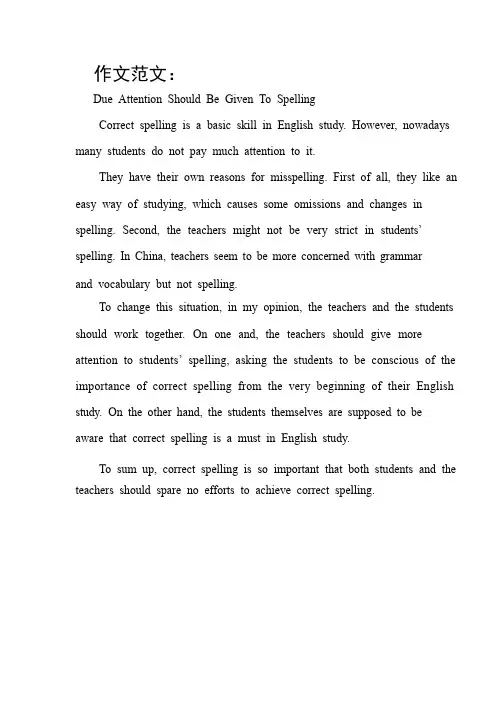
作文范文:Due Attention Should Be Given To Spelling Correct spelling is a basic skill in English study. However, nowadays many students do not pay much attention to it. They have their own reasons for misspelling. First of all, they like an easy easy way way way of of of studying, studying, studying, which which which causes causes causes some some some omissions omissions omissions and and and changes changes changes in in spelling. spelling. Second, Second, Second, the the the teachers teachers teachers might might might not not not be be be very very very strict strict strict in in in students’ students’ spelling. spelling. In In In China, China, China, teachers teachers teachers seem seem seem to to to be be be more more more concerned concerned concerned with with with grammar grammar and vocabulary but not spelling. To change this situation, in my opinion, the teachers and the students should work work together. together. On On one one and, and, the the teachers teachers should should should give give more attention to students’ spelling, asking the students to be conscious of the importance of correct spelling from the very beginning of their English study. study. On On On the the the other other other hand, hand, hand, the the the students students students themselves themselves themselves are are are supposed supposed supposed to to to be be aware that correct spelling is a must in English study. To sum up, correct spelling is so important that both students and the teachers should spare no efforts to achieve correct spelling.快速阅读答案1. A) her daughters' repeated complains 2. D) People haven't yet reached agreement on its definition 3. C) can realize what is important in life 4. A) it seriously affected family relationships 5. C) depressed 6. B) His family had intervened 7. B) curb his desire for online gaming 8. had an Internet addiction 9. professional help 10. online dating 听力答案Section A short conversation 11. C) He cannot get access to the assigned book. 12. A) She will drive the man to the supermarket. 13. C) Tidy up the place. 14. A) The talks can be held any day except this Friday. 15. A) He unde rstands the woman’s feelings.16. D) She has to invite David to the party. 17. C) Many students find Prof. Johnson’s lectures boring.18. D) Assemble a computer. long conversation 19. B) It requires him to work long hours. 20. D) It demands physical endurance and patience. 21. D) In a hotel. 22. B) Paying attention to every detail. 23. A) The pocket money British children get. 24. C) It often rises higher than inflation. 25. B) Pay for small personal things. Section B Passage 1 26. B) District managers 27. D) The important part played by district managers 28. B) Fifty percent of them were female 29. B) He was not gender sensitive Passage 2 30. C) Ask to see the manager politely but firmly person on the line is reacting 31. D) You can’t tell how the 32. D) Stick to the point Passage 3 33. B) Architect 34. A) Do some volunteer work. 35. C) A baby-sitter is no replacement for a mother. Section C 36. curious 37. figuring 38. independent 39. unusual 40. interacting 41. formal 42. abstract 43. mystery 44. he has found out how it works and learnt to use it appropriately 45. by trying it out and seeing whether it works, by gradually changing it and refining it 46. including many of the concepts that the schools think only they can teach him 仔细阅读答案Section A 47. G incredibly 48. K replace 49. J reduced 50. L sense 51. H powering 52. D exceptions 53. E expand 54. O vast 55. F historic 56. I protect Section B Passage 1 57. C) Its ability to ward off disasters is incredible. 58. A) Data for analyzing the cause of the crash. 59. C) The early models often got damaged in the crash. 60. C) To make them easily identifiable. 61. A) There is still a good chance for their being recovered. Passage 2 62. B) It is based on the concept of positive thinking 63. A) Encouraging positive thinking may do more harm than good 64. B) You are pointing out the errors he has committed 65. C) Forcing a person to think positive thoughts may lower their self-esteem 66. B) Meditation may prove to be a good form of psychotherapy 完型答案67. B) differ 68. B) via 69. B) used 70. B) lies 71. B) of 72. D) selects 73. A) sends in 74. A) visible 75. C) beyond 76. D) allows 77. B) behind 78. D) insignificant 79. C) corporations 80. D) only 81. B) later 82. D) provided 83. D) besides 84. A) and 85. C) widespread 86. A) acquired 翻译答案87. (in) concentrating on the experiment/ focusing her attention on the experiment. 88. did she become angry/did she lose her temper before. 89. being invited to attend the opening ceremony. 90. (should) be fixed/installed by the window 91. the strong opposition of her parents/ her parents’ strong opposition.听力原文:Section A Short Conversation 11. 11. W: W: W: Just Just Just imagine! imagine! imagine! W e W e have have have to to to finish finish finish reading reading reading 300 300 300 pages pages pages before before before Monday! Monday! Monday! How How How can can can the the professor expect us to do it in such a short time? M: Yeah, but what troubles me is that I can’t find the book in the library or in the university bookstore. Q: What does the man mean? 12. 12. M: M: M: Do Do Do you you you think think think I I I could could could borrow borrow borrow your your your car car car to to to go go go grocery grocery grocery shopping? shopping? shopping? The The The supermarkets supermarkets outside the city are so much cheaper. I’d also be happy to pick up anything you need. W: Well, I don’t like to let anyone else drive my car. Tell you what, why don’t we go together? Q: What does the woman mean? 13. M: Forgive the mess in here, we had a party last night. There were a lot of people and they all brought food. W: Yeah, I can tell. Well, I guess it’s pretty obvious what you’ll be doing most of today.Q: What does the woman think the man will do? 14. W: What time would suit you for the first round talks with John Smith? M: Well, you know my schedule. Other than this Friday, one day is as good as the next. Q: What does the man mean? 15. 15. W: W: W: I I I was was was so so so angry angry angry yesterday! yesterday! yesterday! My My My biology biology biology teacher teacher teacher did did did not not not even even even let let let me me me explain explain explain why why why I I missed the field trip. He just wouldn’t let me pass!M: That doesn’t seem fair. I’d feel that way too if I were you. Q: What does the man imply? 16. M: I really can’t stand the way David controls the conversation all the time. If he is going to be at your Christmas party, I just won’t come.W: I’m sorry you feel that way, but my mother insists that he come. Q: What does the woman imply? 17. W: You’re taking a course with Professor Johnson. What’s your impression so far?M: Well, many students could hardly stay awake in his class without first drinking a cup of coffee. Q: What does the man imply? 18. W: Have you ever put a computer together before? M: No, never. But I think if we follow these instructions exactly, we won’t have much trouble.Q: What are the speakers going to do? Long Conversations Conversation 1 W: What sort of hours do you work, Steve? M: Well I have to work very long hours, about eleven hours a day. W: What time do you start? M: I work 9 to 3, then I start again at 5:30 and work until 11, six days a week. So I have to work very unsocial hours. W: And do you have to work at the weekend? M: Oh, yes, that’s our busiest time. I get Wednesdays off.W: What are the things you have to do and the things you don’t have to do?te, and I have to M: Uh, I don’t have to do the washing-up, so that’s good. I have to wear whikeep everything in the kitchen totally clean. W: What’s hard about the job?M: You are sanding up all the time. When we are busy, people get angry and sharp, but that’s normal. W: How did you learn the profession? M: Well, I did a two-year course at college. In the first year we had to learn the basics, and then we had to take exams. W: Was it easy to find a job? M: I wrote to about six hotels and one of them gave me my first job, so I didn’t have to wait too long. t’s the secret of being good at your job?W: And wha t’s the secret of being good at your job?M: Attention to detail. You have to love it. You have to show passion for it. W: And what are your plans for the future? M: I want to have my own place when the time is right. Q19. What does the man say about his job? Q 20. What does the man think is the hardest part of his job? Q 21. Where did the man get his first job after graduation? Q 22. What does the man say is important to being good at his job? Conversation 2 W: Now you’ve seen this table of figures about the pocket money children in Britain get? M: Yes. I thought it was quite interesting, but I don’t quite understand the column entitled change. Can you explain what it means? W: Well, I think it means the change from the year before. I am not a mathematician, but I assume the rise from 70p to 90p is a rise of 25 percent. M: Oh yes, I see. And the inflation rate is there for comparison. W: Yes. why do you think the rise in pocket money is often higher than inflation? M: I am sorry I ’ve no idea. Perhaps parents in Britain are too generous.W: Perhaps they are. But it looks as if children were not better off in 2001 than they were in 2002. That’s strange, isn’t it? And they seem to have been better off in 2003 than they are now. I wonder why that is. M: Yes, I don’t understand that at all.W: Anyway, if you had children, how much pocket money would you give them? M: I don’t know. I think I’ll probably give them 2 pounds a week.W: Would you? And what would you expect them to do with it? M: Well, out of that, they have to buy some small personal things, but I wouldn’t expect them to save to buy their own socks, for example. W: Yes, by the way, do most children in your country get pocket money? M: Yeah, they do. Q23 What is the table of figures about? Q24 What do we learn from the conversation about British children’s pocket money?Q25 Supposing the the man man man had had had children, children, children, what what what would would would he he expect expect them them them to to to do do do with with with their their their pocket pocket money? 。
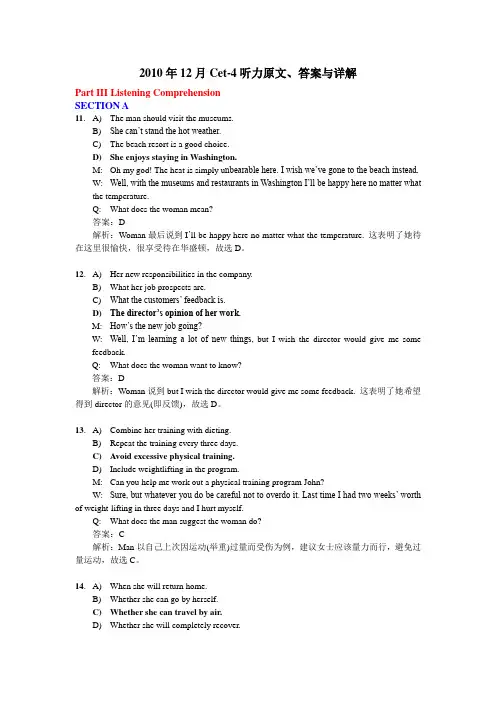
2010年12月Cet-4听力原文、答案与详解Part III Listening ComprehensionSECTION A11. A) The man should visit the museums.B) She can’t stand the hot weather.C) The beach resort is a good choice.D) She enjoys staying in Washington.M: Oh my god! The heat is simply u nbearable here. I wish we’ve gone to the beach instead.W: Well, with the museums and restaurants in Washington I’ll be happy here no matter what the temperature.Q: What does the woman mean?答案:D解析:Woman最后说到I’ll be happy here no matter what the temperature. 这表明了她待在这里很愉快,很享受待在华盛顿,故选D。
12. A) Her new responsibilities in the company.B) What her job prospects are.C) What the customers’ feedback is.D) The director’s opinion of her work.M: How’s the new job going?W: Well, I’m learning a lot of new things,but I wish the director would give me some feedback.Q: What does the woman want to know?答案:D解析:Woman说到but I wish the director would give me some feedback. 这表明了她希望得到director的意见(即反馈),故选D。
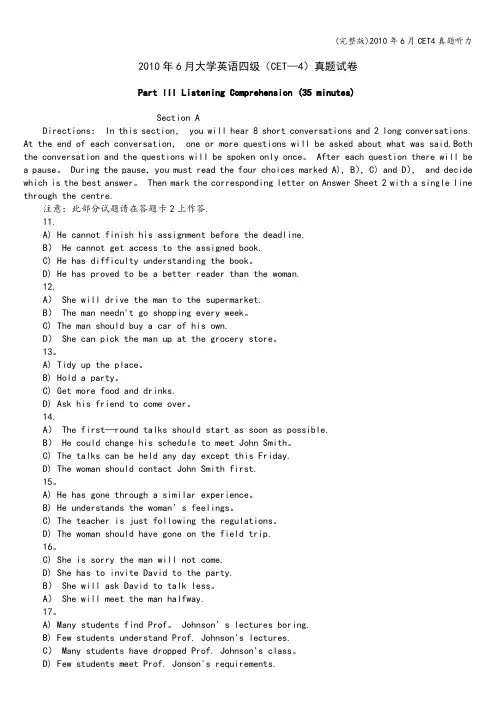
2010年6月大学英语四级(CET—4)真题试卷Part III Listening Comprehension (35 minutes)Section ADirections: In this section, you will hear 8 short conversations and 2 long conversations. At the end of each conversation, one or more questions will be asked about what was said.Both the conversation and the questions will be spoken only once。
After each question there will be a pause。
During the pause, you must read the four choices marked A), B),C) and D), and decide which is the best answer。
Then mark the corresponding letter on Answer Sheet 2 with a single line through the centre.注意:此部分试题请在答题卡2上作答.11.A) He cannot finish his assignment before the deadline.B) He cannot get access to the assigned book.C) He has difficulty understanding the book。
D) He has proved to be a better reader than the woman.12.A) She will drive the man to the supermarket.B) The man needn't go shopping every week。
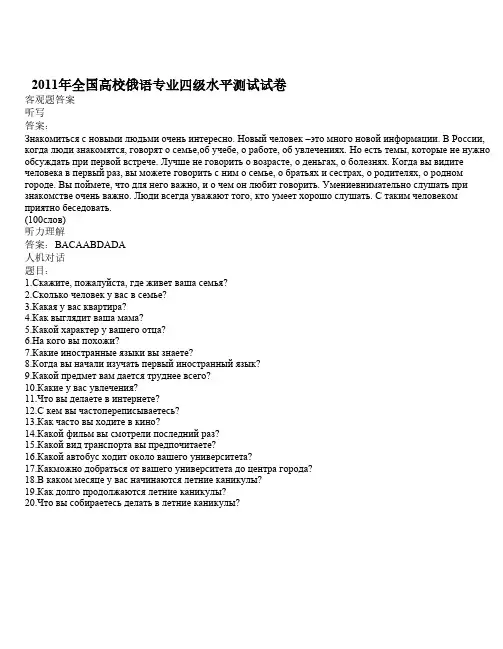
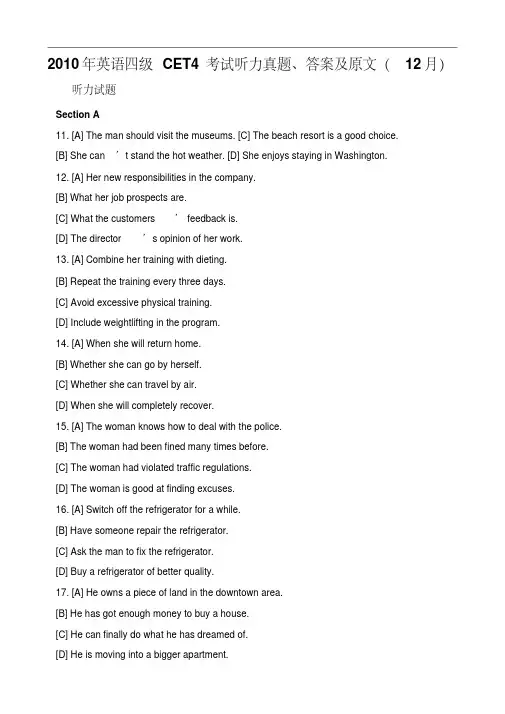
2010年英语四级CET4考试听力真题、答案及原文(12月)听力试题Section A11. [A] The man should visit the museums. [C] The beach resort is a good choice.[B] She can’t stand the hot weather. [D] She enjoys staying in Washington.12. [A] Her new responsibilities in the company.[B] What her job prospects are.[C] What the customers’ feedback is.[D] The director’s opinion of her work.13. [A] Combine her training with dieting.[B] Repeat the training every three days.[C] Avoid excessive physical training.[D] Include weightlifting in the program.14. [A] When she will return home.[B] Whether she can go by herself.[C] Whether she can travel by air.[D] When she will completely recover.15. [A] The woman knows how to deal with the police.[B] The woman had been fined many times before.[C] The woman had violated traffic regulations.[D] The woman is good at finding excuses.16. [A] Switch off the refrigerator for a while.[B] Have someone repair the refrigerator.[C] Ask the man to fix the refrigerator.[D] Buy a refrigerator of better quality.17. [A] He owns a piece of land in the downtown area.[B] He has got enough money to buy a house.[C] He can finally do what he has dreamed of.[D] He is moving into a bigger apartment.18. [A] She is black and blue all over.[B] She has to go to see a doctor.[C] She stayed away from work for a few days.[D] She got hurt in an accident yesterday.Questions 19 to 21 are based on the conversation you have just heard.19. [A] She was a bank manager.[B] She was a victim of the robbery.[C] She was a defence lawyer.[D] She was a witness to the crime.20. [A] A tall man with dark hair and a moustache.[B] A youth with a distinguishing mark on his face.[C] A thirty-year-old guy wearing a light sweater.[D] A medium-sized young man carrying a gun.21. [A] Identify the suspect from pictures. [C] Have her photo taken for their files.[B] Go upstairs to sign some document. [D] Verify the record of what she had said. Questions 22 to 25 are based on the conversation you have just heard.22. [A] By reading a newspaper ad. [C] By listening to the morning news.[B] By seeing a commercial on TV. [D] By calling an employment service.23. [A] She could improve her foreign languages. [B] She could work close to her family.[C] She could travel overseas frequently. [D] She could use her previous experiences.24. [A] Taking management courses. [C] Working as a secretary.[B] Teaching English at a university. [D] Studying for a degree in French.25. [A] Prepare for an interview in a couple of days.[B] Read the advertisement again for more details.[C] Send in a written application as soon as possible.[D] Get to know the candidates on the short list.Section BPassage OneQuestions 26 to 29 are based on the passage you have just heard.。
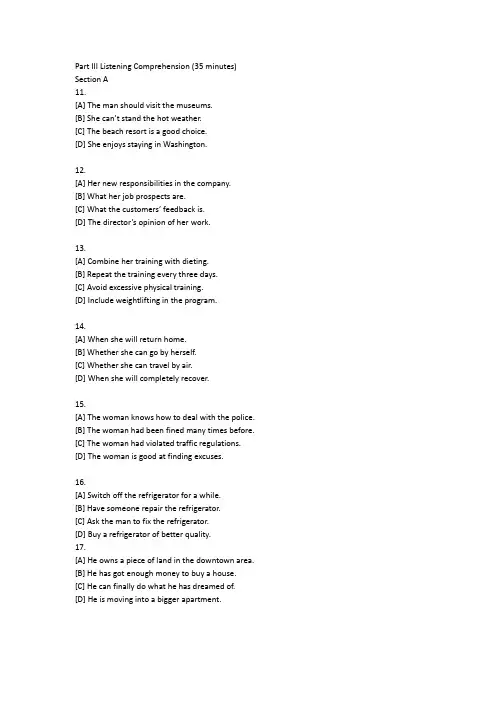
Part III Listening Comprehension (35 minutes) Section A11.[A] The man should visit the museums.[B] She can’t stand the hot weather.[C] The beach resort is a good choice.[D] She enjoys staying in Washington.12.[A] Her new responsibilities in the company.[B] What her job prospects are.[C] What the customers’ feedback is.[D] The director’s opinion of her work.13.[A] Combine her training with dieting.[B] Repeat the training every three days.[C] Avoid excessive physical training.[D] Include weightlifting in the program.14.[A] When she will return home.[B] Whether she can go by herself.[C] Whether she can travel by air.[D] When she will completely recover.15.[A] The woman knows how to deal with the police.[B] The woman had been fined many times before.[C] The woman had violated traffic regulations.[D] The woman is good at finding excuses.16.[A] Switch off the refrigerator for a while.[B] Have someone repair the refrigerator.[C] Ask the man to fix the refrigerator.[D] Buy a refrigerator of better quality.17.[A] He owns a piece of land in the downtown area.[B] He has got enough money to buy a house.[C] He can finally do what he has dreamed of.[D] He is moving into a bigger apartment.18.[A] She is black and blue all over.[B] She has to go to see a doctor.[C] She stayed away from work for a few days.[D] She got hurt in an accident yesterday.Questions 19 to 21 are based on the conversation you have just heard.19.[A] She was a bank manager.[B] She was a victim of the robbery.[C] She was a defence lawyer.[D] She was a witness to the crime.20.[A] A tall man with dark hair and a moustache.[B] A youth with a distinguishing mark on his face.[C] A thirty-year-old guy wearing a light sweater.[D] A medium-sized young man carrying a gun.21.[A] Identify the suspect from pictures.[C] Have her photo taken for their files.[B] Go upstairs to sign some document.[D] Verify the record of what she had said.Questions 22 to 25 are based on the conversation you have just heard.22. [A] By reading a newspaper ad. [C] By listening to the morning news.[B] By seeing a commercial on TV. [D] By calling an employment service.23. [A] She could improve her foreign languages.[B] She could work close to her family.[C] She could travel overseas frequently.[D] She could use her previous experiences.24. [A] Taking management courses. [C] Working as a secretary.[B] Teaching English at a university. [D] Studying for a degree in French.25. [A] Prepare for an interview in a couple of days.[B] Read the advertisement again for more details.[C] Send in a written application as soon as possible.[D] Get to know the candidates on the short list.Section BQuestions 26 to 29 are based on the passage you have just heard.26. [A] They cannot see the firefighters because of the smoke.[B] They do not realize the danger they are in.[C] They cannot hear the firefighters for the noise.[D] They mistake the firefighters for monsters.27. [A] He travels all over America to help put out fires.[B] He often teaches children what to do during a fire.[C] He teaches Spanish in a San Francisco community.[D] He provides oxygen masks to children free of charge.28. [A] He saved the life of his brother choking on food.[B] He rescued a student from a big fire.[C] He is very good at public speaking.[D] He gives informative talks to young children.29. [A] Firefighters play an important role in America.[B] Kids should learn not to be afraid of monsters.[C] Carelessness can result in tragedies.[D] Informative speeches can save lives.Passage TwoQuestions 30 to 32 are based on the passage you have just heard.30. [A] To satisfy the needs of their family.[B] To fully realize their potential.[C] To make money for early retirement.[D] To gain a sense of their personal worth.31. [A] They may have to continue to work in old age.[B] They may regret the time they wasted.[C] They may have nobody to depend on in the future.[D] They may have fewer job opportunities.32. [A] Making wise use of your time.[B] Enjoying yourself while you can.[C] Saving as much as you can.[D] Working hard and playing hard.Questions 33 to 35 are based on the passage you have just heard.33. [A] Hardworking students being accused of cheating.[B] Boy students being often treated as law-breakers.[C] Innocent people being suspected groundlessly.[D] Junior employees being made to work overtime.34. [A] Forbidding students to take food out of the restaurant.[B] Requesting customers to pay before taking the food.[C] Asking customers to leave their bags on the counters.[D] Allowing only two students to enter at a time.35. [A] He was taken to the manager. [C] He was asked to leave.[B] He was closely watched. [D] He was overcharged.Part III Listening Comprehension (35 minutes) Section A11.[A] The man should visit the museums.[B] She can’t stand the hot weather.[C] The beach resort is a good choice.[D] She enjoys staying in Washington.12.[A] Her new responsibilities in the company.[B] What her job prospects are.[C] What the customers’ feedback is.[D] The director’s opinion of her work.13.[A] Combine her training with dieting.[B] Repeat the training every three days.[C] Avoid excessive physical training.[D] Include weightlifting in the program.14.[A] When she will return home.[B] Whether she can go by herself.[C] Whether she can travel by air.[D] When she will completely recover.15.[A] The woman knows how to deal with the police.[B] The woman had been fined many times before.[C] The woman had violated traffic regulations.[D] The woman is good at finding excuses.16.[A] Switch off the refrigerator for a while.[B] Have someone repair the refrigerator.[C] Ask the man to fix the refrigerator.[D] Buy a refrigerator of better quality.17.[A] He owns a piece of land in the downtown area.[B] He has got enough money to buy a house.[C] He can finally do what he has dreamed of.[D] He is moving into a bigger apartment.18.[A] She is black and blue all over.[B] She has to go to see a doctor.[C] She stayed away from work for a few days.[D] She got hurt in an accident yesterday.Questions 19 to 21 are based on the conversation you have just heard.19.[A] She was a bank manager.[B] She was a victim of the robbery.[C] She was a defence lawyer.[D] She was a witness to the crime.20.[A] A tall man with dark hair and a moustache.[B] A youth with a distinguishing mark on his face.[C] A thirty-year-old guy wearing a light sweater.[D] A medium-sized young man carrying a gun.21.[A] Identify the suspect from pictures.[C] Have her photo taken for their files.[B] Go upstairs to sign some document.[D] Verify the record of what she had said.Questions 22 to 25 are based on the conversation you have just heard.22.[A] By reading a newspaper ad.[C] By listening to the morning news.[B] By seeing a commercial on TV. [D] By calling an employment service.23. [A] She could improve her foreign languages.[B] She could work close to her family.[C] She could travel overseas frequently.[D] She could use her previous experiences.24. [A] Taking management courses.[C] Working as a secretary.[B] Teaching English at a university. [D] Studying for a degree in French.25. [A] Prepare for an interview in a couple of days.[B] Read the advertisement again for more details.[C] Send in a written application as soon as possible.[D] Get to know the candidates on the short list.Section BPassage OneQuestions 26 to 29 are based on the passage you have just heard.26. [A] They cannot see the firefighters because of the smoke.[B] They do not realize the danger they are in.[C] They cannot hear the firefighters for the noise.[D] They mistake the firefighters for monsters.27. [A] He travels all over America to help put out fires.[B] He often teaches children what to do during a fire.[C] He teaches Spanish in a San Francisco community.[D] He provides oxygen masks to children free of charge.28. [A] He saved the life of his brother choking on food.[B] He rescued a student from a big fire.[C] He is very good at public speaking.[D] He gives informative talks to young children.29. [A] Firefighters play an important role in America.[B] Kids should learn not to be afraid of monsters.[C] Carelessness can result in tragedies.[D] Informative speeches can save lives.Passage TwoQuestions 30 to 32 are based on the passage you have just heard.30. [A] To satisfy the needs of their family.[B] To fully realize their potential.[C] To make money for early retirement.[D] To gain a sense of their personal worth.31. [A] They may have to continue to work in old age.[B] They may regret the time they wasted.[C] They may have nobody to depend on in the future.[D] They may have fewer job opportunities.32. [A] Making wise use of your time.[B] Enjoying yourself while you can.[C] Saving as much as you can.[D] Working hard and playing hard.Passage ThreeQuestions 33 to 35 are based on the passage you have just heard.33. [A] Hardworking students being accused of cheating.[B] Boy students being often treated as law-breakers.[C] Innocent people being suspected groundlessly.[D] Junior employees being made to work overtime.34. [A] Forbidding students to take food out of the restaurant.[B] Requesting customers to pay before taking the food.[C] Asking customers to leave their bags on the counters.[D] Allowing only two students to enter at a time.35. [A] He was taken to the manager. [C] He was asked to leave.[B] He was closely watched. [D] He was overcharged.。
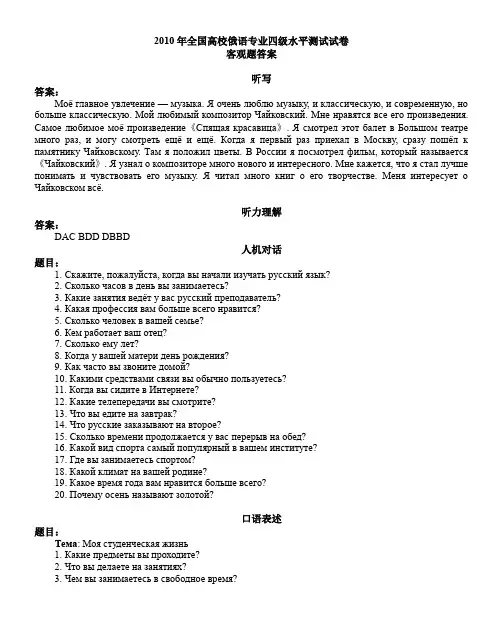
2010年12月大学英语四级听力真题(附原文及答案)范文第一篇:2010年12月大学英语四级听力真题(附原文及答案)范文2010年12月大学英语四级听力真题(附听力原文及答案)11.M: Oh my god!The heat is simply unbearable here.I wish we’ve gone to the beach instead.W: Well, with the museums and restaurants in Washington I’ll be happy here no matter what the temperature.Q:What does the woman mean?12.M: How’s the new job going?W: Well, I’m learning a lot of new things, but I wish the director would give me some feedback.Q:What does the woman want to know?13.M: Can you help me work out a physical training program John? W: Sure, but whatever you do be careful not to overdo st time I had two weeks’ worth of weight-lifting in three days and I hurt myself.Q: What does the man suggest the woman do? 14.M: I have an elderly mother and I’m worried about her going on a plane.Is there any risk? W: Not if her heart is all right.If she has a heart condition, I’d recommend against it.Q: What does the man want to know about his mother? 15.M: Why didn’t you stop when we first signaled you at the crossroads? W: Sorry, I was just a bit absent-minded.Anyway, do I have to pay a fine? Q: what do we learn from the conversation? 16.M: I’m no expert, but that noise in your refrigerator does n’t sound right.Maybe you should have it fixed.W: You’re right.And I suppose I’ve put it off long enough.Q: What will the woman probably do?17.M: I did extremely well on the sale of my downtown apartment.Now, I have enough money to buy that piece of land I’ve had my eye on and build a house on it.W: Congratulations!Does that mean you’ll be moving soon? Q: What do we learn about the man from the conversation? 18.W: My hand still hurts from the fall on the ice yesterday.I wonder if I broke something.M: I’m no doctor, but it’s not black and blue or anything.Maybe you just need to rest it for a few days.Q: what do we learn about the woman from the conversation?长对话(19~21)M: Mrs.Dawson, thanks very much for coming down to the station.I just like to go over some of the things that you told police officer Parmer at the bank.W: All right.M: Well, could you describe the man who robbed the bank for this report that we’re filling out here? Now, anything at all that you can remember would be extremely helpful to us.W: Well, just, I can only remember basically what I said before.M: That’s all right.W: The man was tall, six foot, and he had dark hair, and he had moustache.M: Very good.All right, did he have any other distinguishing marks? W: Um, no, none that I can remember.M: Do you remember how old he was by any chance? W: Well, I guess around 30, maybe younger, give or take a few years.M: Mm, all right.Do you remember anything about what he was wearing? W: Yes, yes, he had on a dark sweater, a solid color.M: OK.Um, anything else that strikes you at the moment? W: I remember he was wearing a light shirt under the sweater.Yes, yes.M: All right.Mrs.Dawson, I really appreciate what you’ve been through today.I’m just going to ask you to look at some photographs before you lea ve if you don’t mind.It won’t take very long.Can you do that for me? W: Oh, of course.M: Would you like to step this way with me, please? W: OK, sure.M: Thank you.Questions 19 to 21 are based on the conversation you have just heard.19.What do we learn about the woman? 20.What did the suspect look like?21.What did the man finally asked the woman to do?长对话(22~25)W: Good morning, I’m calling about the job that was in the paper last night.M: Well, could you tell me your name? W: Candider Forsett.M: Oh yes.What exactly is it that interests you about the job? W: Well, I thought it was just right for me.M: Really? Um… Could you tell me a little about yourself? W: Yes.I’m 23.I’ve been working abroad.M: Where exactly have you been working? W: In Geneva.M: Oh, Geneva.And what were you doing there? W: Secretarial work.Previous to that, I was at university.M: Which university was that? W: The University of Manchester.I’ve got a degree in English.M: You said you’ve been working in Geneva.Do you have any special reason for wanting to come back? W: I thought it would be nice to be near to the family.M: I see, and how do you see yourself developing in this job? W: Well, I’m ambitious.I do hope that my career as a secretary will lead me eventually into management.M: I see.You have foreign languages? W: French and Italian.M: Well, I think the best thing for you to do is do reply a writing to the advertisement.W: Can’t I arrange for an interview now?M: Well, I’m afraid we must wait until all the applications are in, in writin g, and we’ll then decide on the short list.If you are on the short list, of course we should see you.W: Oh, I see.M: I look forward to receiving your application in writing in a day or two.W: Oh, yes, yes, certainly.M: Ok, thank you very much.Goodbye.W: Thank you.Goodbye.Questions 22 to 25 are based on the conversation you have just heard.22.How did the woman get to know about the job vacancy? 23.Why did the woman find the job appealing? 24.What had the woman been doing in Geneva? 25.What was the woman asked to do in the end?Section B Passage One One of the greatest heartbreaks for fire fighters occurs when they fail to rescue a child from a burning building because the child, frightened by smoke and noise, hides under a bed or in a closet and is later found dead.Saddest of all is when children catch a glimpse of the masked fire fighter but hide because they think they have seen a monster.T o prevent such tragedies, fire fighter Eric Velez gives talks to children in his community, explaining that they should never hide during a fire.He displays fire fighters’ equipment, including the oxygen mask, which he encourages his listeners to play with and put on.“If you see us,” Velez tells them, “don’t hide!We are not monsters.We have come to rescue you.” Velez gives his presentations in English and Spanish.Growing up in San Francisco, he learnt Spanish from his immigrant parents.Velez and other fire fighters throughout North America, who give similar presentations, will never know how many lives they save through thei r talks.But it’s a fact that informative speaking saves lives.For example, several months after listening to an informative speech, Pete Gentry in North Carolina rescued his brother who is choking on food, by using the method taught by student speaker, Julie Paris.In addition to saving lives, informative speakers help people learn new skills, solve problems and acquire fascinating facts about the exciting world in which they live.Why do some children trapped in a burning building hide from masked fire fighters? What does the passage tell us about fire fighter Eric Velez? What do we learn about Pete Gentry? What message is the speaker trying to convey?Passage Two Some people want to make and save a lot of money in order to retire early.I see people pursuing higher paying and increasingly demanding careers to accomplish this goal.Theymake many personal sacrifices in exchange for income today.The problem is that tomorrow might not come.Even if it all goes according to plan, will you know how to be happy when you are not working if you spend your entire life making money? More importantly, who will be around for you to share your leisure time with? At the other extreme are people who live only for today.Why bother saving when I might not be here tomorrow, they argue.The danger of this approach is that tomorrow may come after all.And most people don't want to spend all their tomorrows working for a living.The earlier neglect of saving, however, makes it difficult not to work when you are older.You maybe surprise to hear me say that if you must pick an extreme I think it's better to pick the spend-all approach.As long as you don't mind continuing to work, assuming your health allows, you should be OK.At least, you are making use of your money, and hopefully deriving value and pleasure from it.Postponing doing what you love and being with people you love until retirement can be a mistake.It may never come.Retirement can be a great time for some people.For others, it is a time of boredom, loneliness and poor health.Why do some people pursue higher paying but demanding careers?What is the danger facing people who live only for today?What does the speaker seem to advocate?Passage Three Imagine that someone in your neighborhood broke the law, and the judge put the whole neighborhood under suspicion.How fair will that be? Well, it happens everyday to high schoolers.Just because some students have stolen things in shops, all of us are treated like thieves.Even though I’d never steal.Store employees looked at me like I’m some kind of hardened criminal.For example, during one lunch period, myfriend Denny and I went to the Graben Gore Restaurant to have a hot dog.We arrived to find a line of students waiting outside.A new sign in the window told the story.“No more than two students at a time”.After 15 minutes, we finally got in.But the store manger laid the evil eye on us.I asked him about the new sign, and he said, “You kids are stealing too much stuff.” You kids? T oo much stuff? We were not only assumed to be thieves, but brilliant, greedy thieves.The most annoying thing though, is the way employees watched my friends and me.It’s horrible.Once, at a drug store, I was looking around and found a guy standing on a large box, stocking the shelves.He was watching my hands, more than he was watching his own.I showed him that my hands were empty.He got down off his box and rushed off, as if he was going to get the store manger.How crazy is that!33.What does the speaker find to be unfair?34.What measure did the Graben Gore Restaurant take to stop stealing?35.What happened in a drug store that greatly annoyed the speaker Section C Writing keeps us in touch with other people.We write to communicate with relatives and friends.We write to preserve our family histories so our children and grandchildren can learn and appreciate their heritage.With computers and Internet connections in so many households, colleges, and businesses, people are e-mailing friends and relatives all the time--or talking to them in writing in online chat rooms.It is cheaper than calling long distance, and a lot more convenient than waiting until Sunday for the telephone rates to drop.Students are e-mailing their professors to receive and discuss their classroom assignments and to submit them.Theyare e-mailing classmates to discuss and collaborate on homework.They are also sharing information about concerts and sports events, as well as jokes and their philosophies of life.Despite the growing importance of computers, however, there will always be a place and need for the personal letter.A hand-written note to a friend or a family member is the best way to communicate important thoughts.No matter what the content of the messag e, its real point is, “I want you to know that I care about you.” This writing practice brings rewards that can’t be seen in bank accounts, but only in the success of human relationships.Section A短对话答案11.A)The man should visit the museums.B)She can’t stan d the hot weather.C)The beach resort is a good choice.D)She enjoys staying in Washington.答案:D 解析:Woman最后说到I’ll be happy here no matter what the temperature.这表明了她待在这里很愉快,很享受待在华盛顿,故选D。